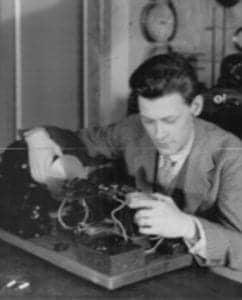Podcast: Download
Subscribe: Apple Podcasts | RSS
 Wondering how to stop subvocalizing?
Wondering how to stop subvocalizing?
Well, let me ask you this:
What if this rather strange term from the world of speed reading is fraudulent? Or what if reducing subvocalization is tactically a false goal for any serious lifelong learner?
Here’s an even better question:
What if there exist strategic ways to use your “inner voice” to read faster?
You’re in luck.
You see, the Magnetic Memory Method stresses the importance of avoiding energy-draining “tactics” so you can focus on enthusiasm-producing strategies that actually help you learn faster and better.
That’s why on this page, we’re going to explore:
- How this strange term “subvocalization” has been defined and used historically.
- The psychological pain used to exploit people who are desperate to learn (this is probably what allows for the perpetuation of pseudo-scientific fraud in this area).
- Real techniques you can use to improve reading comprehension and speed by using your inner voice.
And hey, if after you discover the truth subvocalization you still want to reduce it, I’ve got something for you. I’ll mention a simple trick from the world of meditation that is more likely to get you there.
It’s perfectly a reasonable exercise. And the best part is that it relates scientifically to the nature of consciousness and studies in other aspects of learning where the eyes are involved.
Let’s get started.
What Is Subvocalization?
First of all, there’s a long history to this term, and “subvocalization” isn’t the only word people have used. As Donald L. Cleland and William C. Davies show in “Silent Speech – History and Current Status,” the term also appears as:
- Silent speech
- Implicit speech
- Innervocalization
- Lip reading
- Vocalization
The first recorded observation of people “speaking silently” to themselves occurred in 1868. Two psychologists focused on human physiology created a device like a telegraph key activated by the tongues of their test subjects. Everything they discovered is premised on the idea that parts of your mouth and throat move while you are reading.
Somehow… for reasons no one seems to know… these movements came to be negatively portrayed as a (gasp!) habit.
What we do know is that people who cite the same research clearly haven’t interpreted it as I have. They clearly missed Ake Edelfelt’s conclusion that subvocalization should not be stopped (more on his research-based assessment below).
Frankly, if my interpretation is correct, and the “speed reader” who says the research calls it a bad habit is correct, then one of us is a horrible reader. Given that no one writing on that site uses a full name or lists any academic credentials… I don’t wish to come across as arrogant, but the bad reader probably isn’t me.
Carrying on…
The Historical Devices That Proved Subvocalization Is Normal
Later devices used to study subvocalization included connecting a pneumograph to a kymograph.
Some of these studies may have been mixed up with research into stuttering, which also involved using a pneumograph.
If you read John Madison’s An Experimental Study of Stuttering, for example, he finds that stutters suffer brain fog and poor concentration. But he also finds that the use of a telegraph key for gathering data related to vocalization is highly suspect.
Obviously, early 20th century science was not as sophisticated as what we have today. A lot of different people entered fields of study without necessarily having direct or even indirect credentials.
It is thought, for example, that Rune Elmqvist, inventor of the first pacemaker, may have contributed an early electronically activated writing machine to initial experiments.
It is not that he shouldn’t have, but when you see so many people with so many devices studying phenomena like this, here’s a suggestion. Start thinking “Wild West of Knowledge.” That will be more effective than expecting anything like clear and focused scientific analysis from this historical period.
Indeed, when the first serious publication finally arises in 1960, Ake Edelfelt completely dismisses subvocalizing as a problem:
“Silent speech is universal during silent reading; efforts to eliminate it should be discontinued.”
Jump ahead to the present day and nothing amongst serious scientists has changed. According to research compiled by Scott Young, if you want to read well, you need to subvocalize.
How To Stop Subvocalizing: Seven Weird, Unproven Tips That Probably Won’t Work
The first thing you need to understand is that it’s more than fraudulent to claim that subvocalization should be stopped. It’s contradicted by almost every speed reading program and book I’ve seen.
For example, in a course called “Kwik Reading” by Jim Kwik, you are given ways to reduce subvocalization.
A few videos later, you are told to ask questions while reading.
Well… which is it? Hear your inner voice or don’t hear your inner voice? How are you supposed to ask questions mentally if you’re trying to be silent?
The lack of clarity and the utterly impossible to ignore contradiction in terms should instantly remind you of Ake Edelfelt’s finding: stop trying to do this.
To persist in forcing yourself to be silence is nonsense. In fact, my research has yet to show exactly how something as normal and natural as subvocalizing came to be called a “habit.” It’s even less clear how the speed reading crowd started heaping so many negative connotations on your natural reading voice.
But wait. There’s more, because the advice only gets worse. For example:
One: Keep Reading
A lot of speed reading training books and programs tell you to stop “backreading” or “regressing.”
This “tactic” is utter nonsense for many reasons.
For example, have you ever read Nietzsche? He causes you to reread things he’s said frequently.
Have a look at this passage from The Gay Science:
Owing to three Errors. Science has been furthered during recent centuries, partly because it was hoped that God’s goodness and wisdom would be best understood therewith and thereby – the principal motive in the soul of great Englishmen (like Newton); partly because the absolute utility of knowledge was believed in, and especially the most intimate connection of morality, knowledge, and happiness – the principal motive in the soul of great Frenchmen (like Voltaire); and partly because it was thought that in science there was something unselfish, harmless, self-sufficing, lovable, and truly innocent to be had, in which the evil human impulses did not at all participate – the principal motive in the soul of Spinoza, who felt himself divine, as a knowing being: – it is consequently owing to three errors that science has been furthered.
Nietzsche says he’s going to talk about three errors at the beginning of the passage. He then doesn’t use the word “error” again until the last sentence. To understand what the errors are, you literally have to go back and reread the passage.
Different ways of referring back to points within entire books or even individual paragraphs is a strategy that good writers use all the time. It’s like a P.S. inside of prose, or a callback to a salient point mentioned earlier in the text. If an author says, “As I mentioned back in chapter one,” there is zero reason why you would not go back to reread the passage if you can’t remember it.
Sure, you might “read” faster by not going back to refresh points an author reiterates, but you’re not guaranteed to understand more just by plowing forward. If anything, your path to meaningful comprehension will be slowed, if not destroyed.
Pro tip: Although I strongly disagree that you should avoid “regressing” backwards by rereading information (in fact, one of my most popular posts teaches a rereading strategy), there is a subtle point to be drawn here.
When you can’t understand something and repeating an idea isn’t making it any clearer, moving forward can be helpful. There are many difficult topics I’ve read where I needed to not only keep reading, but also read outside of the text by using supplement guides and other resources.
I also needed to memorize information I did not understand, which is one of the three corrections I made when correcting these three pieces of bad advice memory experts tend to give.
Two: Use Your Finger Or A Pointer
If running a finger, pencil, chopstick or broken antenna from a transistor radio helps you read better, that’s great. You’ll get no argument from me.
But I think you deserve to know the origin of this tactic, which may have hypnotized people around the world into thinking it has an effect it might not.
According to Marcia Biederman in Scan Artist: How Evelyn Wood Convinced the World That Speed-Reading Worked, the origin story of this technique is beyond belief.
Here’s how it goes:
Once upon a time, Evelyn Wood dropped a book. As it was flying through the air, she reached to grab it and noticed she could read a sentence faster as her finger paced beneath it.
Let me ask you this:
How do you read a moving sentence on a small object like a book, even with a finger between your eyes and, say 21 words, flying through the air?
The answer is that this story sounds like nonsense.
Again, I’m not saying that some kind of aid can’t help.
But before you invest a ton of time in it, consider how these tactics come into being in the first place. You could save yourself a lot of time and energy as you use the rule strategies needed for reading faster.
Pro Tip: The rare time I can’t focus, I will use a blank index card to cover up parts of the page I’m not reading. I find this approach useful because it removes the stimulation of all the other words.
It also does it in a way that doesn’t add a meaty finger between my eyes and the text. You can move the index card slowly down without even having your fingers appear near the page.
Three: Count From 10 to 1 While Reading
Counting while reading is another tip from Jim Kwik.
Huh? Vocalize one type of content in the hopes that it will blot out another? I’m not sure how this makes sense.
However, there is a technique related to this that is worth using in the context of meditation. It appears in Gary Weber’s Happiness Beyond Thought.
This techniques stems from the Zen tradition.
To perform the exercise, count from one to ten and try to suppress the even numbers. It’s kind of like playing a game of, “Don’t think of a red cat,” but I’ve found that I actually can do it (even though it took over a year of trying).
Has this exercise helped me concentrate more while reading while also picking up speed and comprehending more?
Yes, but that’s because many meditative activities have been shown to improve memory and concentration for reading. That’s why I practice this technique while meditating, not while reading.
Four: Listen To Music While Reading
Some people can listen to music while reading. When I was younger, I was able to do it all the time. I used to write a lot while listening to music (and sometimes still do).
However, I don’t see how doing this can help reduce your inner voice. This article provides no research to back up the claim and says that “Classical usually music works best.”
Really? Which Classical music? What does “usually” mean?
I don’t know about you, but when I listen to Bach and Beethoven, those masters grab my ears by the throat and don’t let go.
Good music commands our attention, so although I know from personal experience that it’s not impossible, these dubious claims with zero substantial research evidence or even anecdotes make no sense. They only raise questions.
Five: Force Yourself To Read Faster Than Normal
Although there is merit in pushing ourselves for better performance, there’s a potentially huge problem in this suggestion.
For one thing, if you’re pushing yourself to read faster how are you doing it?
Chances are… you’re doing it in thoughts. And that means you’re almost certainly “subvocalizing.”
Plus, speed reading books and courses always advocate defining your “normal” reading speed. They talk about spending a lot of time testing how fast you’re reading and recording the numbers.
I find this practice odd for a few reasons:
- As with the command to read faster, you’re creating mental content that almost certainly places a filter or lens between you and the content you should be focused on.
- Being aware of having a timer on and needing to count words also creates more mental content to think about (and vocalize while reading).
- How many people are actually skilled enough with the numeracy needed to:
- Create and gather accurate data?
- Analyze the data they produce accurately?
- Reasonably and reliably crossindex the speed data against the behaviors of their throats while reading?
By all means, experiment with placing such filters on the reading experience.
As John Graham has shared, adding “obstructions” during memory training helped him win the 2018 USA Memory Competition. But keep in mind that those training efforts were directed at a competition outcome, and there is nothing in particular any memory competitor needs to understand.
When it comes to speed reading competitions, where timing is definitely an issue, I couldn’t find any sample questions to get a sense of how in-depth the comprehension questions go.
That would be interesting to know, as would the specific criteria that apparently satisfied a “group of [unnamed] reporters” that Anne Jones read the final Harry Potter novel in 47 minutes.
I’m seriously suspicious of the intellectual credibility of the questions she was asked, especially when her summary of a novel that was not read in anything like test conditions is that it was “very, very interesting.”
Again, even if we had access to the standard used to question Jones’ comprehension, the larger point is this:
Competition and speed reading demonstration outcomes do not necessarily reflect anything related to the reading comprehension strategies that actually help people get ahead in their lives.
It’s also easy to fake knowledge of fiction, especially pop culture fare, because they are grounded upon well-known principles of narratology, such as the hero’s journey archetype. I’d love to see someone read Naked Lunch by William S. Burroughs in the same period of time. That book too is something anyone could call “very, very interesting.”
Six: Train Your Eyes
I’m not sure how running an infinity sign in front of your eyes with your finger is supposed to stop you from reading in your head.
It’s also not clear how any number of arm movements are supposed to help in this regard, though many speed reading books and courses insert what appears to be elements from Qigong and so-called Emotional Freedom Techniques (EFT) like “tapping.”
Personally, running my eyes around in circles only gives me a headache. I highly recommend you check with a doctor first before engaging in any eye movement exercises. And take other body movement instructions with a grain of salt. There’s no doubt some physical movement can help you read better, but what it has to do with learning how to read without subvocalizing remains a mystery.
Seven: Train with Software
The Internet is awash with software programs purporting to help with different speed reading skills. Most of these softwares show you one word at a time, kind of like certain movie previews flash words on the screen for dramatic effect.
I’m not sure how being shown individual words is going to help, but clearly part of the idea is that you will experience the words so quickly, you won’t have time to sound out the words. I’m not sure if it’s true, but when looking at these softwares, I quickly feel nauseous.

But there’s a catch. I can’t remember which novel it was, I don’t remember anything about the chapter, and who knows… maybe it wasn’t even by Dostoevsky.
Worse, the reading experience was far from pleasurable. In fact, the experience was downright painful, and the only time I ever looked at such software again was while preparing this article.
The Real Way To Stop Subvocalizing
I’ve gone through many tough times due to bipolar disorder. During university, my mind sometimes got so loud during episodes where I could not afford to stop studying that I frequently went to the hospital for help.
Do you want to know what helped?
Increasing the sounds of words, not decreasing them.
Back then, books on tape were still quite rare, and even rarer on CD. But whenever possible, I got them and would listen to the books narrated by professional actors while following along with the text in hand.
And listening to the incomparable George Guidall narrate Dostoevsky’s Crime and Punishment is not something I think I’ll ever forget.
When I couldn’t find a book on tape or CD, which was often the case with the dense philosophy I needed to cover… I narrated the books myself. I often used a micro-cassette recorder so I could review the material at 2x speed. It made me sound like Mickey Mouse, but that was okay because it let me use a powerful technique for memorizing textbooks.
When you’re immersed in the reading experience, you know exactly how to eliminate subvocalization. You do it by merging with the text and loving the reading experience, something that can require a bit of mental strength if you don’t know how to deal with boring topics.
Frankly, I can say that I never read in my head. I always strive to “fuse” with the author so I can assemble with their ideas and share as much as possible of their realm of human consciousness.
What Reading In Your Head Really Means
Because here’s the truth:
Humans never read in their own heads.
No individual owns language. And each brain is an information storage and retrieval “device” that relies on trafficking in words that are shared.
Words aren’t really all that important at the end of the day. It’s the ideas words point to that matters. And when the hucksters get away with shilling their garbage about “subvocalization,” it’s because they’re preying on the pain some people feel when they are locked out of the conversation.
So if you want to be included in great conversations, your best bet is to:
- Increase your vocabulary
- Create detailed study missions
- Read more good books, much more often
And to help you with learning more vocabulary so you can read faster as the path to remembering more, make sure you grab my free memory improvement kit. It will give you access to the universal Memory Palace technique every single person can and should learn.
Until next time, never forget:
We read to interact with the “voices” of others. Vocalize or do whatever you need to do to get at the meaning contained by the words and you cannot help but read better and faster.
Related Posts
- 7 Causes Of Forgetting And How To Eliminate Them Quickly
Discover the common causes of forgetting, from memory decay and interference theory and stress. Then…
- How To Stop Punishing Yourself When You Say Stupid Things
Tired of calling yourself an idiot (or worse)? Learn how some simple memory improvement tools…
- How to Remember What You Read: 11 Proven Steps
Although there is no best way to read, if you want to remember what you…
















40 Responses
Thanks. Eliminating some unproven misbeliefs is what I need.
My pleasure, Ankit.
What kinds of books are you currently reading and what strategies are you using?
So you basically ‘demistify’ the methods of a coach who has worked with over thousands of ppl, and you give no alternatives to work on it other than “fuse with the text”.
I just used all those methods, for like 20 minutes, and my reading went from 200wpm to almost 400wpm.
Thanks for your post.
Claiming to have worked with thousands of people does not equal evidence of having gotten them results.
If you’ve used all of those methods to read as quickly as you claim, then I don’t know how you could conclude that there are no alternative suggestions here.
Not only there are multiple suggestions here, but also many links for further reading and even more tactics you can use.
But I would not expect people using the pseudoscientific tactics of so-called “speed readers” to spot this additional value, which is precisely why I’ve offered this criticism. Thank you for helping to demonstrate the point.
I saw this on my bookmarks and read it for old times (very nostalgic).
Anyway, what is the fastest one can get by means of regular reading (inner vocalization and all).
Any known feats on interleaving? (How much ground can one cover)?
I think one lesson that should come out of this topic is that there’s no such thing as “regular” reading.
Next, it should be clear that speed of reading is not nearly as important as direction and progress towards a goal, as well as enjoyment.
Interleaving does not create “feats” and I’m not sure why anyone would chase after them. Rather, interleaving is known to increase recall and understanding. It’s what one does with the recall and understanding that might become a feat, but it might also become expertise, which need not perform feats in order to be extraordinarily valuable to oneself and to others.
Evening sir….. Hope you are well. I found your subvocalizing article in my bookmarks and read it for old times sake (your speed reading video was my intro into your channel).
Anyway, I commented on the subvocalization page…..
But I forgot to ask….. do you have any intentions of making a video/article on Howard Berg?
He is an anomaly when it comes to the topic of speed reading, as he slices through curriculums in record time (and has students who did so according to him).
I would personally really love your take on this……. as again, I feel he is the one speed reader (as far as I know) that has the credentials (that your insight on will be extremely valuable ).
Ps- I’m not by any means trying to convince you into agreeing speed reading. I personally never went beyond merely “tinkering” with speed reading anyway.
And your reading video is what I do now (interleaving). So I’m for now concretely just regular reader (and enjoy reading more then ever btw).
So yeah, I loved your speed reading article…… But I really would love (personally), your review of Howard Berg (only if you want of course).
Take care
Thanks for your interest in my take on Howard Berg.
I think the Guinness World of Records Review is enough:
“Reading Fast. 80 pages (25,000 words) per min is the supersonic “reading” speed claimed by Howard Stephen Berg (b 1949, Brooklyn, NY), who has convinced a number of TV hosts that he comprehends and remembers what he scanned, perhaps not the details, but the concepts, with the details left for a later, slower reading. He teaches speed reading and gives lectures throughout N America on using the unused part of one’s brain.”
In case anyone misses it, this is the key line:
He has “convinced a number of TV hosts.”
Why on earth Guinness included this is beyond me, but if anyone is impressed by this “proof,” they have some critical thinking skills to acquire.
I’m glad that you’re enjoying reading more. That should be the goal, and in that case I would say that you are an extraordinary reader!
Thank you. And I’m very grateful for you thinking I’m a good reader.
Anyway, the exact statistics on Bergs speed also caught me a bit off guard myself.
I mean, if he truly can do it then great. Speed never really had my interest anyway….. it was more concentration and remembering.
Speed reading kind of caught me because I thought it was unorthodox basically.
But do you have intentions of reviewing the academic side of his work? (Eg his claims of speed learning and him and his students being capable of finishing entire curriculums In a semester (I think he also had children finish courses intended for adults too….according to him)).
Let’s look at this a different way:
1) What about those claims are “academic”?
2) Where in the data, which amounts to claims made by him, would one conduct such research?
3) What is “unorthodox” about yet another scammer using basic tools of persuasion to dupe gullible people? It’s all too orthodox if you ask me.
4) What specific revelation do you think an analysis from me would bring that would help you or anyone else in a concrete way?
I had a long response but backspaced it all.
Rather I’ll send you a few videos and you’ll see what I mean.
You gave the best critique against speed reading that I’ve seen.
The thing is though, howard Berg isn’t like most speed readers…. As he claims his course leads to “speed learning”
If a person saw your speed reading criticism first….. but then theoretically saw his content next….. I see them getting into it all over again to be honest.
And yeah, he claims more then speed reading…. I’ll show you soon.
Your critique will be of utmost value (that’s only if you want to of course)
Actually, I’d prefer your long response and am very unlikely to watch a bunch of videos without extended explanation that answers the questions I’ve already shared with you.
No worries if not, but I’m sure you’ll understand if I’m not able to invest time in explaining why none of these claims are worth pursuing.
But if you want to visit the time and prove that you have:
A) Learned these skills
B) Set up appropriate scientific testing (with proper controls) and captured the data
C) Demonstrated in scientifically valid ways that the same results can be reliably reproduced based on appropriate analysis of a proper hypothesis
Thus far, “speed learning” is as meaningless as “speed reading.”
Sure, people can learn fast. But learn exactly what fast and for what specific outcome that anyone cares about?
Please consider answering the previous questions and these questions before chewing up any more time on the fellow who you have not properly capitalized.
Don’t take that as a criticism, because I make typos too.
But do take it as a signal of one of the realm problems we face, which is accurate thinking.
Deleting all that you’ve written is the reduction of your potential for accurate thinking. I’m very happy to practice with you, but you’ll need to participate in your own words and not expect others to meet your burden of proof.
Make sense?
You see, the thing is…. You seeing a video from the horses mouth itself is far more valuable then me telling you.
I back spaced all of what I was telling you because no amount of what I say compares to you seeing for yourself the full scope of what he claims to offer (context being God).
It’s better from the horses mouth then from me.
I WILL say this though. From all the stuff I recall…. this is some of the things he advises.
– when reading, looking at the schematic clues is of value (eg when we see a word like coca cola we instantly know what it means…. And even if a word is jumbled we still can perceive it)
-when reading sentences, read in clusters rather then word to word (though this Takes getting used to). Reading in clusters means you see an entire set of words or sentence as a single thing rather then word at a time.
– In speed reading….. always look for the “who”, “what”, “where”, “when” and “why” and “how”
As well as the verbs and nouns
The topic sentence contains the most important information
– if something is not important,don’t read it
– for maths there’s an element of the method of loci, because he has pictures for numbers 1-10 (1-is a light post I think, and I think 4 was a car due to the 4 wheels).
One thing though is Howard Berg allows going back and rereading.
Actually, horses don’t speak and videos don’t answer questions about why the person asking for commentary on them thinks they’re worthy of consideration.
If your memory of what Howard Berg is saying is correct, then you’ve exposed one of the most rotten cores in the material of those teaching so-called “speed reading.” And Berg is hardly alone in perpetuating such drivel, which is itself instructive.
No one amongst us can tell the future. So how is someone trying to learn a topic supposed to know what’s important or not?
With that approach to reading, of course he has to “allow” people to go back and reread. If you’re skipping things, you’ve doomed yourself to doing that anyway because skipping things is more often than not a very bad idea.
Context is god, remember?
Yeah I guess.
I don’t know man. I guess style points is a Thing. I mean reading fast seems cool. I can see why people would get drawn into it…….as reading fast looks really cool (where as reading slowly, taking notes, and other added prep may seem geeky).
But it’s about practicality.
If you read slowly to fully comprehend what you read, take breaks if needed, reread for better understanding…… And most of all, convert the words into imagery…… So what if it takes more time! You have fire power at your disposal.
It’s a safer route then a very debatable route in speed reading…. which at best seems really good in theory.
I’m not knocking speed reading (all due respect to them)….. who knows, maybe something Is out there as far as speed reading goes.
But I’ve made my choice.
But anyway, lastly…. So your final verdict on Howard Berg?
Scientific and critical thinkers don’t make “final” verdicts.
To this point, I’ve not been convinced by anything you’ve suggested that makes me feel further analysis is warranted at this time.
But I am always open to something that might, noting Hitchens’ razor that extraordinary claims require extraordinary evidence.
Of evidence, I’ve seen none that makes any particular respect “due,” though you have to admit that the Guinness listing is pretty hilarious. They have a good sense of humor and hat’s off to them for that… at least, I think so. Maybe they didn’t intend it as a joke at all.
Yeah
But I have been thinking though. For a lot of people, they do want to learn which is a good thing.
That’s why speed reading is perhaps very checkered as a path.
The “What if” (this could work) lingers in every students mind (that’s serious about learning).
That’s why in my opinion it’s safer to first go with slower reading and a lot of prep work with notes and stuff. There’s definitive gains to be made there.
This way if someone still wants to give speed reading a try, at least they have a solid foundation already in place (thus they don’t feel guilty for potentially quitting or getting derailed should they see that speed reading is not for them).
I agree to a certain extent that the interest is a good sign.
But I would avoid attributing this “what if” question to “every” student’s mind. How is it possible for this to be in “every” mind given the meaning of the word “student”?
In my view, if there is a solid foundation to be had, it is in using tools of analysis to show that there is no foundation as such and most people are diminishing their powers by forming mental pictures of the world based on inaccurate statements.
Focus on learning the substrates of consciousness in which these linguistics errors occur as you refine your rhetorical skills and “what if” questions about speed reading will be revealed as not only absent from most minds (student or otherwise), but completely irrelevant to what really works in reading.
Yeah true.
Anyway, regarding my experiences with shutting down subvocalization, it came through me practising Harry kahnes work.
Basically while writing with my non dominant hand (left hand)….. I recite rap songs in my mind.
So while writing an essay with my left hand and rapping in my head at the same time, there’s a point where I read what I wrote without subvocalization (as I’m so caught up rapping, that proof reading what I wrote just naturally gets done).
This is why one thing on this article (the thing about counting while you read to mute subvocalization) was something I POTENTIALLY disagreed with, because when doing Harry kahne work I feel reading while reciting something does lead to non subvocalization.
But again, I never brought it up, because I don’t consider that a speed reading skill, but a concentration skill!
And yeah man…… It’s tough on the head. To work like that for mental training I understand….. But reading…… I don’t know man.
How specifically did you test the supposed absence of subvocalization? Do you have the professional equipment needed to do so?
I suggest not making such claims in the future and not relying on what you “feel.” That’s how pseudoscience flourishes, and I’m sure you don’t want to associate yourself with that.
Or do you?
Professional equipment??
Anyway, I Dont want to be associated with pseudo science.
What I’m trying to say is as far as not subvocalizing goes, when writing an essay while reciting poetry, I can still read while reciting the songs at the same time.
But it’s a Harry kahne thing, not a speed reading thing
You posted:
“There’s a point where I read what I wrote without subvocalization.”
In order to make such a claim, you would need to test this with equipment that tests the level of subvocalization – as discussed in the post that you are commenting on.
One way that we can ensure that we’re engaging in elevated conversation that holds intellectual and scientific rigor at a premium is to avoid making wild claims that we cannot support with evidence.
Another way you can elevate the discussion is by demonstrating you’ve read what you’re commenting on and not loop in wildly disparate comments about topics like Harry Kahne.
Or am I forgetting something about his guide and his demonstrations? Does he discuss the suppression of subvocalization?
If anything, I’d say it was quite the opposite, and your description of rapping while not subvocalizing doesn’t entirely make sense, at least not to me, and certainly not in the context of the definition of this term that the so-called “speed readers” have distorted with their charlatanism.
No, you misunderstand the rapping Part.
Basically, Harry Kahne has exercises where you recite poetry while writing stuff down.
So with me, I recite rap songs while writing.
And when reading through the writings, I’m still rapping the verses in my head.
Rapping the verses in my head while reading what’s on the page (not aloud).
It’s very much aligned with Harry Kahne’s discipline….. And by that logic, There’s a chance that reading while counting from 1-10 might also be possible.
Emphasis on might be possible (relax, I’m not being pro speed reading).
Given what you’re saying and how you’re saying it, I most certainly do misunderstand.
And all the more so given your decision to not address the questions and suggestions that were posed to you.
Why? What’s not clear of what I’m saying?
I humbly suggest a full review of the entire conversation, the entire post on the page you’re commenting on and a review of the express purpose of the Kahne material.
If you wish to carry the discussion further, I’ve given you plenty of material to respond to without further equivocation.
I don’t understand how what I’m saying is “equivocation”.
You’re trying to make it out like I’m dishonest or something?
I’m not trying to be vague with ambiguous terms. I’m literally saying that reciting poetry or music and proof reading can done simultaneously (and is possible).
Is it really hard to visualize that?
Also Harry Kahne isn’t a “disparate” comment. How do you think that?
In this article, counting from 1-10 while reading is critiqued.
I understand that!
But Harry Kahne also suggests things like reciting poetry while writing your name and details and all.
Proof reading your work while reciting lines. It’s not hard to fathom where I’m going at here.
Anyway, was only trying to help. AND I WAS DEFINITILY NOT INTENDING TO BE VAGUE (DISHONEST).
You are equivocating now by not addressing the initial points I made in response to your post.
You’re now doubling down on the issues that have concerned me all along by reverting to all-caps. Is this really the rhetorical strategy you want associated with your name?
Or would you prefer to acknowledge that subvocalization has a particular meaning?
If not, it is an equivocation to continue attributing it to someone who does not use the term while employing the term under a false definition. You are doing this while avoiding answering questions about how you’ve tested its absence.
If you want to help, don’t shout in all-caps on this blog and address the concerns at hand. This is a serious issue and I’m sure you would not want to further mislead people, and hopeful that you don’t want to continue in the vein you’ve been pursuing thus far. It is completely out of alignment with myself and, I suspect, would be out of alignment with Kahne’s goals for charitable discussion, which requires focus on the matters at hand.
Fine my apologies.
Look, I’m not trying to validate subvocalization as a thing. And I wasn’t trying to mislead anyone as I want them to learn too.
Was just saying that as far as it goes (no subvocalization), when writing while reciting poetry, briefly proof reading in your head while at the same time still reciting poetry is possible (thus the number counting while reading might potentially be possible).
But I’m not sure how to prove that.
This was never to validate speed reading.
It’s very difficult to see that you’re not trying to validate subvocalization.
If you’re not sure how to prove something or demonstrate the validity of the claim, it’s often best left unsaid. Wittgenstein was strong on this point:
“Whereof one cannot speak, thereof one must be silent.”
Sometimes I subvocalize when I read, but not always. Aside from that, I noticed something interesting this morning. I happened to start playing a game and I realized that I was subvocalizing the colors as I chose them. I thought this was completely unnecessary and just willed myself to stop doing it, which worked perfectly. I found that I could choose the colors without naming them internally. No technique. I just decided and stopped.
This is interesting, Kathy.
How did you determine that you stopped subvocalizing? Did you have the specialty equipment needed to properly make this assessment?
Hi, it’s very in interesting that you mention Gary Weber, because elimination of subvocalization for him is part of a spiritual path, over and above the context of reading. It’s very common in the spiritual field to say the inner voice went quiet leaving permanent peace, and many would say that the uncontrolled inner narrative is a chief cause of suffering.
Thing is, it’s also framed as a long and often arduous quest for inner silence. Gary Weber practiced deconstructing his identity for years before his inner space went silent, whereas people in the subvocalization field are saying it’s fairly quick and easy process to shut down the inner voice.
It may be that for someone like Gary Weber the silence is multi-faceted including all kinds of senses and cognitive activity other than just voice, which may be a lot harder, the aim more encompassing.
When someone stops subvocalizing, does anything like a sense of self, or suffering, go with it?
Or is subvocalization a small facet of inner narrative building – remove it and the narrative is still there it just hasn’t got hold of the throat muscles?
If you have any thoughts on this it would be interesting to read.
Thanks for your post.
I discuss one of the exercises suggested by Weber as an example of where “suppression” has value – in meditation, not reading.
There is almost certainly subvocalization going on while completing this exercise, and I humbly suggest reconsidering the reference in the full context of this article.
..ah, looking at the Amazon preview I see you’re familiar with Jeffery Martin’s work, I’ve done one of his courses and that’s the kind of angle I was coming from about this. I was wondering if it’s really necessary to pay the price of memory issues at the far end of PNSE. I should read the book. Thanks.
I would indeed suggest reading Dr. Weber’s books and I describe how I memorized the Sanskrit he presents in The Victorious Mind.
It’s possible someone could draw a connection between subvocalization and goals like PNSE, but I throw PNSE itself into question in The Victorious Mind. I don’t think the name itself makes sense on its face.
(It doesn’t make non-sense either in a way that I think coheres with what nondual texts are trying to convey, particularly with respect to the paraconsistencies that experiences of “enlightenment” seem to require.)
Thanks for the reply. I meant your book rather than Gary’s got that one already. Yeah I don’t there’s a perfect term, it was a near enough job as I understand it that had to be culturally neutral. I take your point about context – sub-vocalization isn’t necessarily a bad thing. Did Gary say anything about it- that it had died down post awakening? And if you went round with a gadget measuring people like Gary (I know he’s done brain scans and wotnot) would you find a general trend of quiet?
Thanks for your follow up and for reading my book.
Dr. Weber has talked about no longer experiencing SRIN (self-referential inner narrative). I’ve also had this experience, though to a lesser extent than what he describes. I still have great success reducing it, however.
If he draws any connection to subvocalization in the context of the speed reading charlatans or in any context, I haven’t seen it.
The whole point of the quiet in the Weber that I’ve read has nothing to do with reading, but with obsessive thinking. I don’t recall him talking about reading at all, but he obviously does, and makes reference to the studies he’s read, etc. He also talks about how thoughts arise when making plans, or especially when hungry or tired.
Again, there’s a big difference he’s making based around SRIN and I can’t see any connection between what he discusses and the topic of subvocalization.
Thanks you again for replying. Well I’m counting thinking and subvocalization as the same process – the inner voice. To me it feels the same – the little voice that blabs along while I read (and turns reading into listening), but also while I’m not reading – Weber’s ‘blah blah’. Having said that, maybe I could look a bit closer to see if they’re really the same. Maybe other people are different, some people naturally have no inner voice – that kind of thing.
Inner voice is yet another topic and not necessarily related to the topic of subvocalization while reading.
I applaud any attempt to look closer and not going merely on how things feel – even if there is a sense that one can only “sense” the data presented by others through the “senses.”
Empiricism surely has its flaws, as does reason. But the alternative seems less worth pursuing when it comes to how I interpret Dr. Weber’s worthy cleaving to both the science of self-inquiry and the outward focused science of empiricism, which he has discussed in many videos and recorded presentations.
Note that in his Evolving Beyond Thought, the Sanskrit from the Ribhu Gita he presents places a primacy on scientific exploration of consciousness in a way that is not only empirical, but relies on memory and maximizing one’s accuracy about how it works and how it interacts with accuracy around the meaning of words and accuracy around how they are used in context.